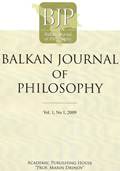A Process Identity: The Aesthetics of the Technoself. Governing Networking Societies
A Process Identity: The Aesthetics of the Technoself. Governing Networking Societies
Author(s): Oana ȘerbanSubject(s): Philosophy, Aesthetics, Social Philosophy, Special Branches of Philosophy, Philosophy of Science
Published by: Институт по философия и социология при БАН
Keywords: technoself; process identity; networking societies; knowledge-based societies; aesthetics of existence; panopticism; digital personae; databased selves; process ontology
Summary/Abstract: The main aim of this article is to analyse the relationship between two innovative concepts—the technoself and process identity—from a perspective inspired by process ontology. The working hypothesis is that industrialized and mass societies entered into a post-industrial or informational sphere of capitalism, becoming networking societies—also known as knowledge-based societies—which closely followed their role in approaching the plural identity of the digital Subject and the surveillance practices exercised in its governance as correspondent models for the changes of the current reality. The first section of the article is devoted to research on the technoself, a concept recently introduced by Luppicini in 2013. Criticizing the technoself in terms of process ontology and as a result of digitalization, subjectivity, and technical rationality, I will argue that the constitution of digital subjects, as well as their interactions, should be defined in terms of processes. Therefore, I introduce the concept of process identity—which includes the technoself—and explain how this approach contributes to the development of different research fields (such as speculative realism and object-oriented ontology) and how it affects Floridi’s distinction between digital ontology and informational ontology. The second section focuses on the effects of the digital environment on self-constitution practices and techniques, virtual worlds experiencing what Foucault recognizes as the aesthetics of existence. In the final part, I confront Bentham’s and Foucault’s panopticism, arguing that based on what is accomplished by process identities, networking societies represent societies of control, not disciplinary ones, and consequently this distinction should be applied in governing virtual communities. In the end, I will explain why notions such as digital personae or databased selves are insufficient, and should be replaced by the concepts of process identity and technoself, respectively, in order to improve the models of governing networking societies.
Journal: Balkan Journal of Philosophy
- Issue Year: VIII/2016
- Issue No: 2
- Page Range: 165-174
- Page Count: 10
- Language: English

